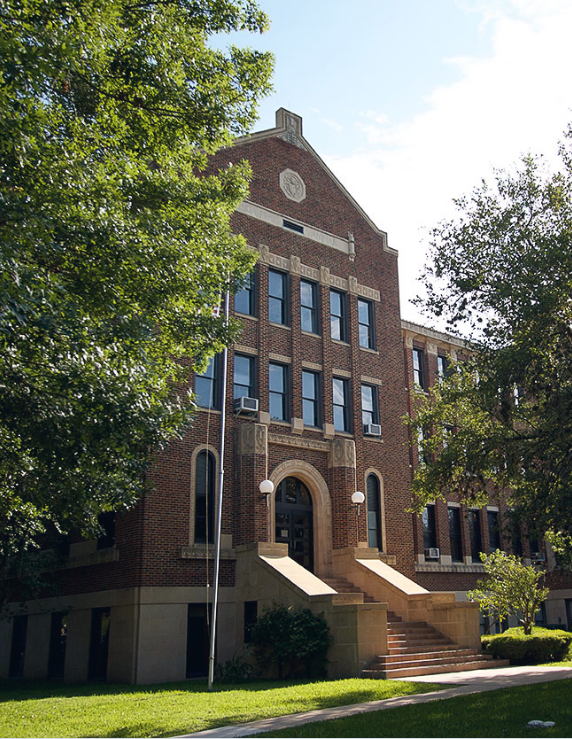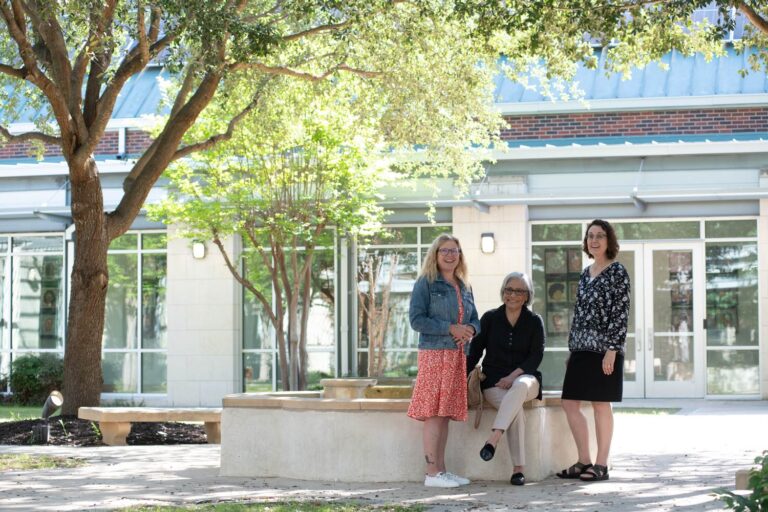“During our time here, our hearts, and God willing our ministries, have been touched by the Oblate cross… So, how will our ministries be true to that blessing? What does it mean to be disciples whose hearts have been touched by the Oblate cross?”
The following is the 2017 Commencement Address for Certificate programs at Oblate School of Theology, delivered by Victor Carmona, Ph.D.
¡Buenos días! Good morning, everyone! It is a pleasure to join you this morning in celebrating your graduation. El Padre Ron Rolheiser, OMI, me invitó a compartir con ustedes unas palabras en inglés y en español. I am grateful to Father Rolheiser for the opportunity to address you this morning. Como saben, as many of you know, el repetirse a si mismo en inglés y en español, repeating one’s self in English and Spanish, puede resultar en un discurso que es tanto largo como aburrido, can lead to an address that is both long and borring. So, I will not say the same thing twice but will rather weave back and forth between Inglés y Spanish. This is, after all, San Antonio, Texas!
Qué día tan especial. Este día representa la culminación de sus esfuerzos durante muchas tardes y noches, y durante muchos fines de semana. Felicidades a ustedes y a sus familias. Sus estudios en Espiritualidad y Dirección Espiritual, en el Instituto de Formación Pastoral, y en el Lay Ministry Institute, les han preparado para prestar su servicio pastoral con mayor conocimiento y, Dios mediante, con mayor entrega al pueblo amado de Dios. Hoy, ustedes pasan a ser exalumnos de Oblate School of Theology, pero no por eso dejan de ser parte de la familia oblata. Al revés, cargan con la bendición de tener un corazón que ha sido tocado por la cruz oblata, la cruz que cargan los padres y hermanos oblatos que han conocido durante sus estudios, la cruz que vieron en todos los salones de la escuela, la cruz que está ante nosotros en esta capilla. During our time here, our hearts, and God willing our ministries, have been touched by the Oblate cross.
So, how will our ministries be true to that blessing? What does it mean to be disciples whose hearts have been touched by the Oblate cross? I am sure that there are as many answers to these questions as there are Oblates, Oblate associates and Oblate friends throughout the world! Let me share a few reflections with you, reflections that I hope will be affirming in the ministry that awaits us beyond the doors of this beautiful chapel. ¿Qué implica ser un discípulo cuyo corazón y servicio pastoral han sido tocados por la cruz oblata?
Creo que en esta capilla podemos encontrar algunas respuestas. En ella encontramos claves de tres señales o marcas distintivas que porta un corazón que ha sido tocado por la cruz oblata. Primero, un corazón tocado por la cruz oblata es esperanzador. Como María Inmaculada, patrona de los oblatos y de esta capilla, ese corazón busca curar y sanar en un mundo rasgado por la injusticia. Así mismo, un corazón tocado por la cruz oblata vive su fe como José, con humildad. (No lo ven, pero José está aquí a un costado, siempre presente mas apuntando más allá de sí mismo.) Y finalmente, un corazón tocado por la cruz oblata se atreve a amar como Jesús, con la alegría de confiar que nada, ni la muerte misma, nos separa del amor de Dios. Indeed, if our hearts have been touched by the Oblate cross, then our ministries will bring healing in a world that is torn by injustice, they will speak to a faith that is lived in humility, and they will witness the joy that comes from knowing that nothing, not even death itself, can separate us from the love of God.
Let me say a few words on each of these three marks.
First, if our hearts have been touched by the Oblate cross, then our ministries should follow the example of Mary Immaculate, patroness of this chapel (and whose statute is up there). Our ministries should bring healing in communities that are torn by injustice. In their constitutions and rules, the Missionary Oblates of Mary Immaculate set out to “announce the liberating presence of Jesus Christ and the new world born in his resurrection […, to] hear and make heard the clamor of the voiceless, which is a cry to God who brings down the mighty from their thrones and exalts the lowly (cf. Lk 1:52).” If these last words sound familiar, it is because they are inspired by Mary’s Magnificat, her psalm of praise as recounted in the Gospel of Luke. Mary’s words—and indeed Mary’s life—reflect a deep and abiding hope in the Good news of a God who inspired her to speak and live up to these prophetic words. We must do so as well. If we believe that the Kingdom or Reign of God is already among us, then we must proclaim it and live accordingly. In the Reign of God, all relationships bear the mark of God’s love and justice. Yet racism, fear of the immigrant, and fear of the poor keep many of our relationships from bearing those marks. Our ministry must acknowledge as much. We must be spiritual directors, pastoral agents, and lay ecclesial ministers who bring the healing ministry of the Church in a manner that is aware that we will be serving persons and communities that are marred by those realities, either as those who suffer under their weight or as those who force such burdens upon others. This mission is not an easy one. While it calls for the conversion of those we serve, more importantly, it calls for our own ongoing conversion, and on this point, I think we can learn much from Joseph. Si la cruz oblata ha tocado nuestro corazón, entonces estamos llamados a ser discípulos que proclaman y sirven la buena nueva con esperanza. Como María Inmaculada, estamos llamados a sanar y curar en comunidades rasgadas por la injusticia, pues proclamamos el reino de Dios, un reino en el cual toda relación refleja el amor y la justicia de nuestro Padre.
Esto nos lleva a un segundo rasgo que tiene un corazón tocado por la cruz oblata. Lograr lo anterior implica buscar dos cosas en nuestro servicio como directores espirituales, asistentes pastorales, o como ministros laicos. Implica facilitar la conversión que Jesús está trabajando en las personas y en las comunidades en las que servimos. Pero lo más difícil es que implica reconocer con humildad que nosotros mismos debemos vivir una conversión continua. En este segundo punto creo que tenemos mucho que aprender de la humildad de José. En nuestra cultura tendemos a pensar que la humildad es simplemente hacer lo que la estatua de José hace en esta capilla: estar presentes sin ser el centro de atención. Pero la humildad no es eso, o mejor dicho es más que eso. El ser humilde consiste en reconocer que Dios debe estar al centro de nuestras vidas y de nuestras comunidades, no nuestro orgullo como hombres (para quienes hemos sufrido de machismo), incluso, no nuestro orgullo de ser miembros de tal o cual parroquia, iglesia, o movimiento. El ser humilde consiste en reconocer que Dios debe estar al centro, no el dinero, no el poder, no las relaciones malsanas. Servir al prójimo con un corazón que ha sido tocado por la cruz oblata implica servirle con humildad, siempre conscientes de nuestras propias fallas. Esa humildad nos ayudará a recordar que somos copartícipes de la Iglesia cuyo ministerio es sanar. Esa humildad nos llevará a reconocer en quien sirvamos a un digno hijo de Dios para que ellos y ellas también se reconozcan como tal. Este es un gran reto, sobre todo si vamos a servir a quienes nuestra sociedad margina, pero una humildad oblata hace posible arriesgar tal cosa. So, we must strive to minister as humble spiritual directors, pastoral agents, and lay ministers who are aware of our need for ongoing conversion. Otherwise, we will be unable to dare acknowledge in all who we serve—especially those who are poor and marginalized—their dignity as human beings and as sons and daughters of God.
Finally, if our hearts have been touched by the Oblate cross, then our ministries will witness the joy that comes from knowing that nothing, not even death itself, can separate us from the love of God. What we are talking about, though, is a Christian understanding of joy. I know that, at times, some of us are tempted to live our baptismal vows as if Easter Sunday were not preceded by Good Friday, as if a Christian understanding of joy should deny, or worse ignore, the reality of Christ’s suffering—or our own. At other times we might be tempted to live out our faith as if Good Friday is all there is to it, as if Christ’s resurrection were yet to happen. Our ministry must acknowledge the reality of Good Friday. The reality that many of those who we will serve continue to suffer as crucified peoples. Yet, our ministry must always be faithful to the joy of Easter Sunday. On this point, let me quote from Pope Francis:
God never tires of forgiving us; we are the ones who tire of seeking his mercy. Christ, who told us to forgive one another “seventy times seven” (Mt 18:22) has given us his example: he has forgiven us seventy times seven. Time and time again he bears us on his shoulders. No one can strip us of the dignity bestowed upon us by this boundless and unfailing love. With a tenderness which never disappoints, but is always capable of restoring our joy, he makes it possible for us to lift up our heads and to start anew. Let us not flee from the resurrection of Jesus, let us never give up, come what will.
That is what the ministry of those whose hearts have been touched by the Oblate cross looks like. It is tender to the point of restoring the joy of knowing ourselves to be God’s beloved so that all of us, especially those who are poor and marginalized, may lift up our heads and start anew, come what may. Nuestro ministerio, entonces, debe llevar a los demás la alegría de la buena nueva del amor de Dios porque como dice el papa Francisco, “Nadie podrá quitarnos la dignidad que nos otorga este amor infinito e inquebrantable. Él nos permite levantar la cabeza y volver a empezar, con una ternura que nunca nos desilusiona y que siempre puede devolvernos la alegría.” Si nuestros corazones han sido tocados por la cruza oblata, entonces buscaremos siempre llevar esa alegría a quienes servimos.
So to conclude, congratulations to you and your loved ones! Confío en que todos nuestros corazones han sido tocados por la cruz oblata. Confío en que ese hecho nos inspira a servir como directores espirituales, agentes pastorales, y ministros laicos que buscan sanar proféticamente en un mundo rasgado de injusticia, como María; que son humildes porque reconocen que Dios está al centro, como José; que se atreven a amar como Jesús crucificado y resucitado, con la alegría de confiar que nada, ni la muerte misma, nos separa del amor del Padre en el Espíritu Santo. May we give witness to the Oblate cross, may they bring prophetic healing to a world marred by injustice, as Mary did. May we be as humble as Joseph, remembering that God must always be at the center of all we do. May we bring the joy that comes from knowing that nothing, not even death itself, can separate us from the love of God.
Thank you to the Oblates for being witnesses of the cross, thank you to all in Oblate School of Theology for their friendship, and thank you, graduates, for all you are about to do. And may our hearts be daring in the healing, humility, and joy of proclaiming the Good news of God’s love in all we do.
Muchas gracias, querida familia oblata.
Commencement Address for Certificate programs at Oblate School of Theology
By Victor Carmona, Ph.D., 2017



